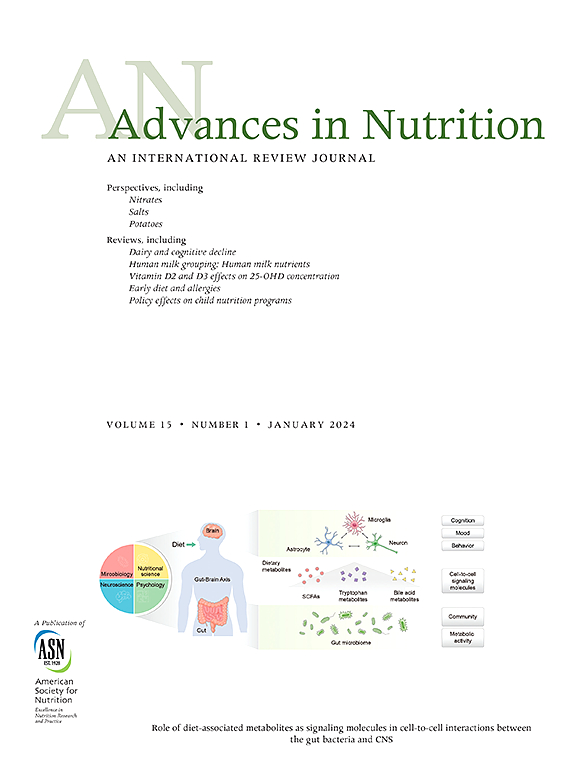Diet Item Details: Reporting Checklist for Feeding Studies Measuring the Dietary Metabolome (DID-METAB Checklist)—Explanation and Elaboration Report on the Development of the Checklist by the DID-METAB Delphi Working Group
IF 9.2
1区 医学
Q1 NUTRITION & DIETETICS
引用次数: 0
Abstract
Metabolomics is a postgenomic, systems-based discipline offering valuable applications in nutrition research, including the use of objective biomarkers to characterize dietary intake and metabolic responses more accurately. A scoping review identified the need for reporting guidance on dietary information in the form of a checklist to ensure reproducibility of human feeding studies that are measuring the diet-related metabolome. In this study, we aimed to gain consensus on a core outcome set pertaining to diet-related item details (DIDs) and recommendations for reporting DIDs to inform development of a reporting checklist. The goal of this checklist is to guide researchers on the minimum level of content and detail required for reporting dietary information in human feeding studies measuring the metabolome. A 2-stage online Delphi process encompassing 5 survey rounds with international experts in clinical trial design, feeding study intervention implementation, metabolomics, and/or human biospecimen analyses was conducted. A core outcome set encompassing 29 DIDs and accompanying recommendations was developed across 5 domains: dietary intervention—modeling (8 DIDs), dietary intervention—implementation (3 DIDs), dietary assessment (9 DIDs), adherence and compliance monitoring (4 DIDs), and bias (5 DIDs). The reporting guideline (DID-METAB Checklist) was generated and accepted by the international expert working group in the final survey round. All experts agreed that relevant journals should include the checklist as a suggested reporting tool for relevant studies and/or used alongside existing reporting tools. This report provides examples, explanations and elaboration for each recommendation including examples from published literature and references. The DID-METAB Checklist will be a key tool to advance the standardized reporting for feeding studies assessing the metabolome. Implementation of this tool will enable the ability to better interpret data and ensure global utility of results for furthering the advancement of metabolomics in nutrition research and future precision and personalized nutrition strategies.
膳食项目详细信息:喂养研究报告清单测量膳食代谢组(DID-METAB清单)- DID-METAB德尔菲工作组关于制定清单的解释和详细报告
代谢组学是一门后基因组学、基于系统的学科,在营养研究中提供了有价值的应用,包括使用客观生物标志物更准确地表征饮食摄入和代谢反应。一项范围审查确定了以清单形式报告饮食信息指南的必要性,以确保测量饮食相关代谢组的人类喂养研究的可重复性。在本研究中,我们旨在就饮食相关项目细节(DIDs)的核心结果集和报告DIDs的建议达成共识,从而为报告清单的制定提供信息。该清单的目的是指导研究人员在人类喂养研究中报告饮食信息所需的最低含量和细节,测量代谢组。进行了两阶段的在线德尔菲过程,包括与临床试验设计、喂养研究干预实施、代谢组学和/或人类生物标本分析方面的国际专家进行的5轮调查。核心结果集包括29个did和相关建议,涵盖5个领域:饮食干预建模(8个did)、饮食干预实施(3个did)、饮食评估(9个did)、依从性和依从性监测(4个did)和偏倚(5个did)。报告指南(DID-METAB Checklist)在最后一轮调查中被国际专家工作组生成并接受。所有专家一致认为,相关期刊应将该清单作为相关研究的建议报告工具和/或与现有报告工具一起使用。本报告为每项建议提供了例子、解释和阐述,包括来自已发表的文献和参考文献的例子。DID-METAB检查表将成为促进代谢组学研究标准化报告的关键工具。该工具的实施将使更好地解释数据的能力,并确保结果的全球效用,以促进代谢组学在营养研究和未来精确和个性化营养策略中的进步。
本文章由计算机程序翻译,如有差异,请以英文原文为准。
求助全文
约1分钟内获得全文
求助全文
来源期刊

Advances in Nutrition
医学-营养学
CiteScore
17.40
自引率
2.20%
发文量
117
审稿时长
56 days
期刊介绍:
Advances in Nutrition (AN/Adv Nutr) publishes focused reviews on pivotal findings and recent research across all domains relevant to nutritional scientists and biomedical researchers. This encompasses nutrition-related research spanning biochemical, molecular, and genetic studies using experimental animal models, domestic animals, and human subjects. The journal also emphasizes clinical nutrition, epidemiology and public health, and nutrition education. Review articles concentrate on recent progress rather than broad historical developments.
In addition to review articles, AN includes Perspectives, Letters to the Editor, and supplements. Supplement proposals require pre-approval by the editor before submission. The journal features reports and position papers from the American Society for Nutrition, summaries of major government and foundation reports, and Nutrient Information briefs providing crucial details about dietary requirements, food sources, deficiencies, and other essential nutrient information. All submissions with scientific content undergo peer review by the Editors or their designees prior to acceptance for publication.
 求助内容:
求助内容: 应助结果提醒方式:
应助结果提醒方式:


